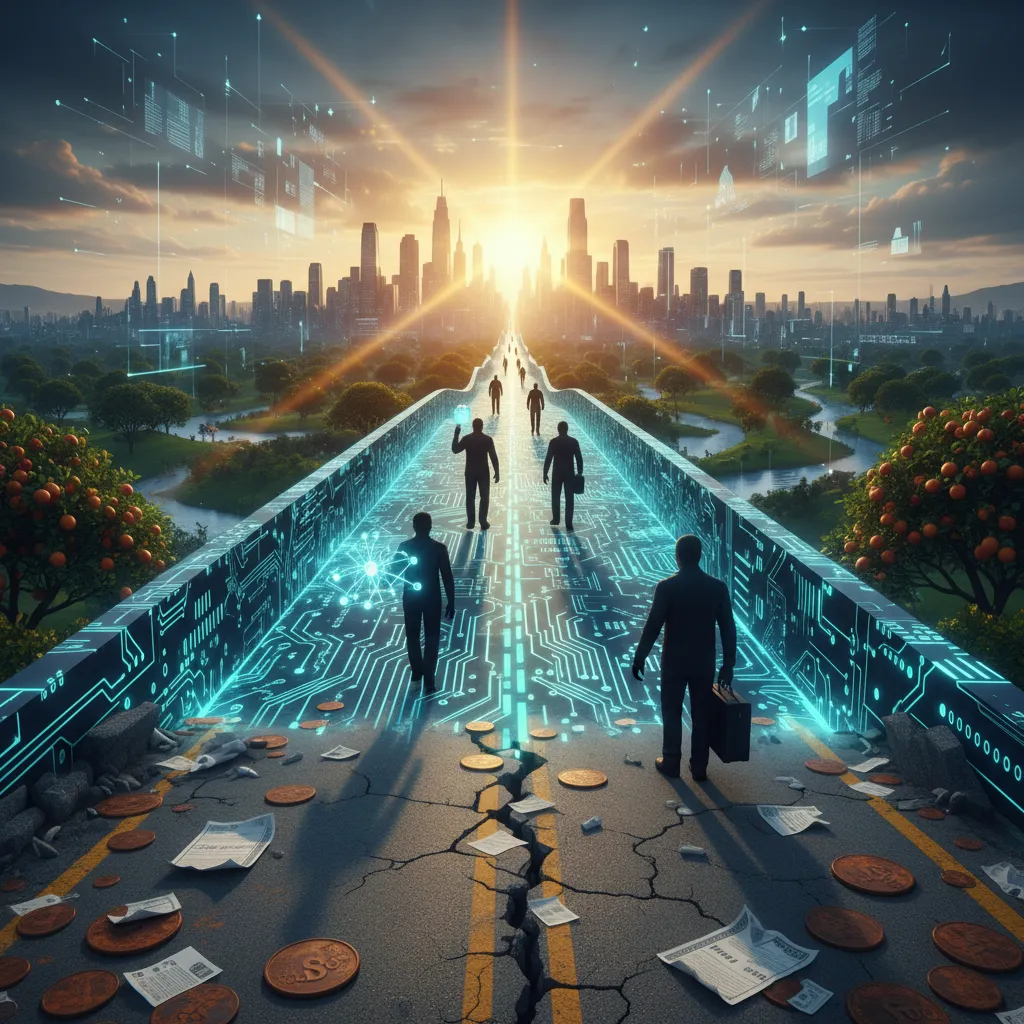Confession: the other day I asked my phone what time the laundry cycle would finish, and it replied—cheerier than any human ever could. It was one of those moments that made me pause. Had AI snuck into my world, quietly and completely? It turns out, the bots are everywhere—some I invited, others just showed up, tinkering behind the scenes. Join me as I unravel my own slow-motion tumble into the arms of AI, and maybe, see if you spot a bit of yourself in my story.
Section 1: My Quiet AI Encounters (a.k.a. How I Realized My Toaster is Smarter Than Me)
It started with my coffee maker. Every morning, I'd stumble into the kitchen, eyes barely open, and there it was—perfectly brewed coffee waiting for me. For weeks, I patted myself on the back for finally getting my morning routine down to a science. Until one day, I realized I hadn't actually set the timer the night before.
That's when it hit me. My coffee maker had been learning my habits, quietly adjusting to my chaotic schedule. Research shows that AI bots are a pervasive, often unnoticed part of routine life, and suddenly I understood what that meant. My morning companion wasn't just a machine—it was an AI personal assistant disguised as kitchen equipment.
The revelation didn't stop there. Last month, I spent twenty minutes chatting with what I thought was the most patient customer service representative ever. The conversation flowed naturally as they helped me track a delayed package. Only later did I notice the telltale "Powered by AI" disclaimer at the bottom of the chat window. I'd been having a heart-to-heart with a bot, and honestly? It was more helpful than half the human representatives I'd dealt with before.
As experts note,
"AI is quietly becoming a part of our daily lives. From managing our schedules to controlling our home environments, AI is seamlessly integrated."This integration became crystal clear when my smart speaker started acting like a gentle, persistent parent. "Don't forget to water your plants," it would chime in the evenings. "Time for the dog's walk," it'd remind me just as I was settling into the couch.
These weren't random alerts—my daily AI usage had evolved into something almost... caring? The algorithms had studied my patterns, noticed when I forgot things, and stepped in to fill the gaps. My digital companions weren't just responding to commands; they were anticipating needs I didn't even know I had.
The moment of clarity came during a lazy Sunday when I counted my AI bots interactions. My phone's assistant had suggested the perfect playlist for my mood. Netflix's AI recommended a documentary that perfectly matched my interests. Even my fitness tracker nudged me to move when I'd been sitting too long. Many users underestimate the number of AI-driven interactions they have daily, and I was definitely one of them.
What struck me most wasn't the technology itself—it was how seamlessly these AI in daily life moments had woven themselves into my routine. I wasn't living in some futuristic sci-fi movie; I was just... living. With digital helpers that had quietly become part of my everyday story.
The realization felt both amusing and slightly unsettling. My toaster might not be plotting world domination, but it's definitely smarter than I initially gave it credit for. And honestly? I'm not sure I mind having these invisible assistants making my life a little easier, one perfectly timed coffee at a time.

Section 2: The Hidden Orchestra—How AI Bots Work Their Magic (Without a Drumroll)
Picture this: you're scrolling through Netflix at 11 PM, exhausted from a long day, when suddenly the perfect movie appears in your recommendations. Not just any movie—but that obscure indie film from 2019 that somehow captures exactly how you're feeling. It happened to me last Tuesday, and honestly? It was both impressive and slightly unnerving. How did an AI bot know I needed that specific emotional escape?
This is the reality of our AI technology trends—these digital orchestras playing softly in the background, conducting symphonies of data we rarely notice. Behind every seamless experience lies an AI bot processing information, predicting our needs, and making life just a little bit easier. Until something glitches, and we suddenly realize how much we've been relying on these invisible helpers.
What strikes me most about the artificial intelligence impact on our daily lives is its subtlety. These bots don't announce themselves with fanfare. They quietly learn our patterns, adapt to our preferences, and customize experiences without us even realizing it's happening. Your morning coffee order suggestion? AI. That perfectly timed reminder to leave for your appointment? Also AI.
But here's where it gets really interesting—and where the scope of this AI revolution becomes clear. As experts predict, AI could add trillions of dollars to the global economy. We're not just talking about convenient movie recommendations anymore. Research shows that AI bots are driving both subtle personal experiences and enormous economic change across industries.
From healthcare to finance, education to entertainment, AI in business is reshaping how entire sectors operate. In healthcare, AI bots help doctors analyze patient data faster than ever before. Financial institutions use them to detect fraud in milliseconds. Even logistics companies rely on AI to optimize delivery routes, saving both time and fuel.
The transformation affects many industries around us, and as the data suggests, "The AI revolution is already underway, transforming our world." These changes happen very fast, with AI development accelerating at a pace that sometimes feels overwhelming. One day you're manually typing search queries, the next you're having conversations with chatbots that feel surprisingly human.
What fascinates me is how AI bots streamline operations and drive innovation without most of us paying attention. They're the backstage crew of our digital lives—essential but invisible. They curate content, deliver news, and even help us learn new skills, all while we focus on our daily routines.
AI's presence spans diverse industries with concrete impacts, yet we often only notice when something goes wrong. When your smart home system misunderstands a command, or when autocorrect creates an embarrassing text message, suddenly we're reminded of the complex technology working behind every interaction.
The economic boost from AI could transform industries and create new opportunities worldwide. It's not limited to one region—this is truly a global phenomenon reshaping how businesses operate, from customer service to logistics, creating ripple effects we're only beginning to understand.

Section 3: The Beginner's Dilemma—My Flirtation with Fear (and How I Got Over It)
Let me paint you a picture. There I was, staring at my laptop screen, feeling like I'd just been dropped at the base camp of Mount Everest with nothing but flip-flops and a granola bar. The world of AI for beginners felt impossibly vast, and honestly? Terrifying.
As experts note,
"Many beginners find AI a bit scary. The field of AI can seem very complex."And boy, did I feel that complexity crushing down on me. Every article I opened was packed with jargon that might as well have been ancient hieroglyphics. Neural networks, machine learning algorithms, natural language processing—it was like everyone was speaking a secret language I'd never been invited to learn.
My first real embarrassment came during what I thought was a customer service chat. I spent ten minutes being overly polite to what turned out to be a chatbot, even saying "please" and "thank you" like it had feelings. When I realized my mistake, I felt ridiculous. But then it hit me—everyone starts somewhere, right?
The Pizza Explanation Disaster
Here's where things got interesting. Armed with half-understood concepts and misplaced confidence, I decided to impress my friends at dinner with my newfound AI knowledge. Someone asked about machine learning, and I launched into this elaborate pizza analogy.
"Think of it like... teaching someone to make pizza," I said, gesturing wildly with my fork. "The AI tastes a thousand pizzas, learns what makes them good, and then... makes better pizzas?" The confused stares told me my AI learning tips needed work.
But you know what? That disaster taught me something valuable. Research shows that fear and confusion are completely normal for new AI users, but approachable learning makes a huge difference. I was trying to run before I could walk.
Finding My Way Through the Fear
The breakthrough came when I stopped trying to understand everything at once. Instead of overcoming fear of AI through brute force learning, I started small. I played with simple chatbots. I watched beginner-friendly videos. I asked basic questions without worrying about looking smart.
Slowly, something shifted. The mountain started looking more like a hill with interesting paths to explore. I realized AI wasn't this intimidating overlord waiting to steal my job—it was just a tool. A really sophisticated one, sure, but still just a tool designed to help, not replace.
The anxiety began melting away as small wins accumulated. Successfully using an AI writing assistant for the first time. Understanding what "training data" actually meant. Having a conversation with a chatbot that felt genuinely helpful rather than creepy.
Looking back, my flirtation with fear taught me that the transition from intimidation to acceptance isn't just natural—it's necessary. Every expert was once a beginner who felt overwhelmed by complexity. The difference between giving up and pushing through often comes down to one thing: remembering that curiosity beats perfection every single time.

Section 4: Strategies for Taming the Bots—What Finally Worked for Me
After months of spinning my wheels, I finally cracked the code on building AI skills. The breakthrough came when I stopped trying to become an AI expert overnight and started treating it like learning to cook—one simple recipe at a time.
My first real victory? I ditched the intimidating technical manuals and focused on understanding one bot type completely before moving to the next. Instead of drowning in complexity, I started with the basics. Research shows that consistent, incremental progress trumps cramming or perfection, and boy, was that true for me. I spent a week just figuring out how a simple chatbot worked, then moved on to image generators.
Setting Goals That Actually Mattered
Here's where I got creative with my AI learning tips—I set quirky, personal goals that made the whole process fun. Like getting an AI to write my grocery list in rhymes (surprisingly harder than it sounds), or having it help me draft emails to my landlord. These weren't just random experiments; they were custom goals that personalized my learning journey.
The magic happened when I stopped asking "What should I learn?" and started asking "What do I want to achieve?" Did I want AI for productivity at work? Better personal task management? Once I defined clear objectives, everything clicked into place.
The Power of Messy Practice
Practical doing beats passive reading every single time. I learned more in one afternoon of tinkering with ChatGPT than I did reading articles for weeks. Sure, I failed constantly—my early attempts at getting AI to help with work projects were laughably bad. But those failures taught me more than any tutorial ever could.
I started engaging with different AI tools, trying various platforms, experimenting without fear. Each mistake became a lesson. Each small success built my confidence. The hands-on approach was absolutely critical to my growth.
The Game-Changer: Consistency Over Intensity
But here's the real secret sauce:
"This single most effective tactic is consistent regular practice. Doing something regularly is more important than almost anything else."
I discovered that ten minutes every morning with my AI tools beat those marathon weekend learning sessions hands down. Small, regular study sessions work because your brain learns best through repetition and habit. Consistency builds strong learning patterns that make new knowledge stick.
Instead of cramming for hours and burning out, I created a simple routine. Morning coffee, five minutes with a writing AI. Lunch break, quick experiment with a productivity bot. These tiny moments added up to real mastery over time.
The transformation wasn't dramatic—it was gradual, steady, and surprisingly sustainable. My confidence grew not from perfecting everything at once, but from showing up consistently, one small step at a time.
Section 5: The Road Ahead—Exploring, Sharing, and Going Off Script
Here's what I've realized about my AI journey—it's like learning to cook. Just when I think I've mastered the basics, someone shows up with a coffee maker that practically reads my mind, and I'm back to feeling like a beginner. The humbling truth? There's always something new bubbling up in the future of AI.
But that's exactly what makes this adventure so thrilling. Research shows that exploration and peer sharing are powerful for AI skill development and enjoyment, and I've experienced this firsthand. When I joined my first AI learning community, I expected serious technical discussions. Instead, I found people laughing about their chatbot's weird obsession with banana bread recipes or celebrating because they finally got their smart home assistant to understand their accent.
These communities became my unexpected safe harbor. Sharing silly mistakes with strangers who became friends? Pure gold. Someone in Tokyo helped me troubleshoot my morning routine automation while I helped a student in Ohio understand why her AI kept suggesting dinosaur documentaries for her cooking playlist. We're all figuring this out together, stumbling through the same delightful confusion.
Now here's my wild card vision for where this is all heading—imagine swapping AI-generated recipes with someone halfway across the globe, not knowing if you'll end up with fusion tacos or accidentally invent the next viral food trend. The possibilities feel limitless when you think about how these digital companions are quietly weaving connections between complete strangers.
Your story probably looks nothing like mine, and that's the point. Maybe your AI helps you manage anxiety, or perhaps it's become your writing buddy during late-night creative sessions. Whatever your experience, I want to hear about it.
"Your journey in AI is unique, and the impact you can make is limitless."
This quote from the source material perfectly captures what I've learned. Every interaction, every small breakthrough, every moment when your digital companion surprises you—it all adds up to something bigger than we might realize.
So here's my invitation: share your oddball AI stories. Tell me about the time your smart assistant misunderstood you in the most perfectly wrong way, or when you had that "aha" moment that changed everything. What questions are keeping you up at night about where this technology is heading?
Because the real magic isn't in the algorithms or the processing power—it's in how we're all navigating this brave new world together, one slightly confused conversation with our digital companions at a time. The road ahead is unscripted, unpredictable, and absolutely worth exploring.
What's been the most surprising part of your AI journey so far? I'd love to hear your story.
TL;DR: AI bots are already woven into our daily routines, making life easier and more connected. You don’t need to be a tech whiz to benefit—start small, keep exploring, and let a little digital magic become your everyday helper.



